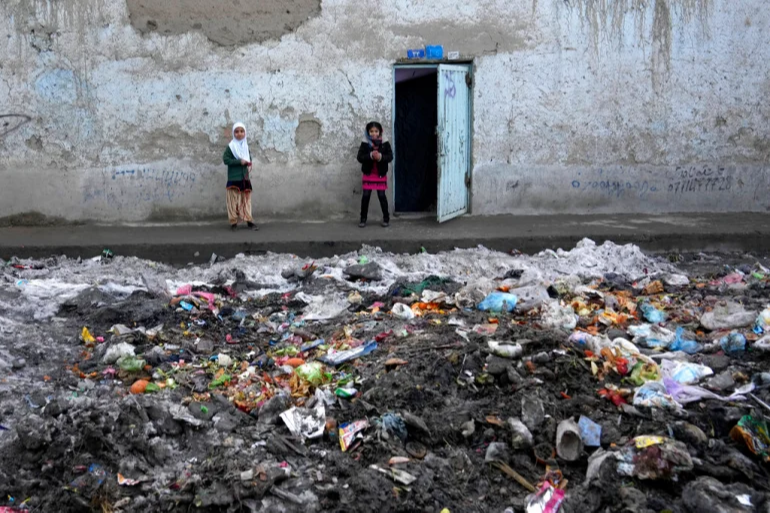
Two young girls stand outside their house in Kabul, Afghanistan.
Afghanistan is experiencing a dire humanitarian crisis with millions facing hunger [File: Hussein Malla/AP Photo]
Kabul, February 12 (RHC)-- U.S. President Joe Biden’s decision to effectively seize the Afghan central bank’s funds in the United States and repurpose half of the money as compensation to the victims of the 9/11 attacks has drawn rebuke and accusations of “theft” against Washington.
Biden issued an executive order on Friday that would split $7.1 billion belonging to Da Afghanistan Bank (DAB) almost evenly between humanitarian assistance to the struggling country and funds to cover judgements from lawsuits that 9/11 victims and their families had filed against the Taliban in U.S. courts.
“The people of Afghanistan had nothing to do with 9/11; that is an undeniable fact,” Bilal Askaryar, an Afghan-American activist, told Al Jazeera. “What Biden is proposing is not justice for 9/11 families, it is theft of public funds from an impoverished nation already on the brink of famine and starvation brought on by the United States’ disastrous withdrawal.”
The U.S.-backed Afghan government collapsed in August of last year, with the Taliban capturing Kabul amid the pullout of US troops from the country after a 20-year war. Washington, which had negotiated its withdrawal with the Taliban, quickly moved to freeze DAB’s U.S.-based assets. The 9/11 victims’ families then sought the money through the courts. One particular case that had obtained a default judgement against the Taliban in 2012 became central in that effort.
The plaintiffs originally sued a host of entities and individuals across the Middle East and Afghanistan – many at odds with one another and adversarial to al-Qaeda, which carried out the attacks in 2001. The defendants included former Iraqi President Saddam Hussein, Lebanon’s Hezbollah, Iran’s Supreme Leader Ali Khamenei – and the Taliban.
Halema Wali, cofounder of Afghans for a Better Tomorrow, a U.S.-based advocacy group, stressed that the money in the Afghan central bank belongs to the people of Afghanistan, who are experiencing a dire humanitarian crisis.
With skyrocketing inflation and the state institutions in shambles, the Afghan economy – which has depended on foreign aid – is all but falling apart. The UN World Food Program has warned that 23 million people are facing “severe hunger” in the country. “It’s absolutely egregious,” Wali told Al Jazeera of Biden’s move. “This is equivalent to essentially saying the central bank of Afghanistan can’t function, but we’re going to set aside some money for a little bit of food for a starving population. I think overall, it’s very short-sighted.”
It remains unclear how that money would be dispensed with several lawsuits making claims to the funds. Plaintiffs may also reject Biden’s decision and seek the entire sum, and courts would have to decide on the outcome, which would be subject to appeal.
Still, the White House suggested that regardless of what happens in the courts, at least $3.5bn will be set aside for 9/11 victims’ families. “Even if funds are transferred for the benefit of the Afghan people, more than $3.5 billion in DAB assets would remain in the United States and are subject to ongoing litigation by US victims of terrorism,” the White House said. “Plaintiffs will have a full opportunity to have their claims heard in court.”
But for now, the final word on unfreezing the money for humanitarian aid and compensation to the 9/11 victims remains with the courts. A senior administration official told reporters early on Friday that it will be months before the money is released for humanitarian relief in Afghanistan.
“Because we have to go through a judicial process here, it is going to be at least a number of months before we can move any of this money, right? So this money isn’t going to be available over the next couple of months regardless – so, regardless of amount, regardless of what we might want to do,” the official told reporters.
Another issue that adds to the uncertainty surrounding the fate of the funds is that Washington does not recognise the Taliban as the government of Afghanistan. “There’s a legitimate question to be asked as to how a country’s sovereign wealth can be used to satisfy the debt of an entity that is not recognised as the sovereign government,” said John Sifton, Asia advocacy director at Human Rights Watch (HRW).

